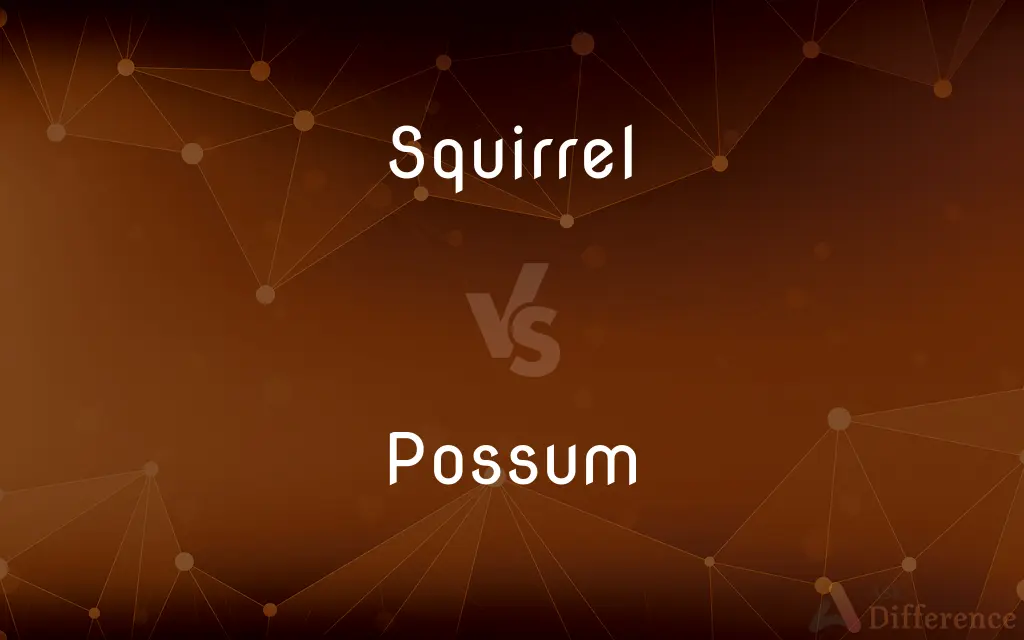Squirrel vs. Possum — What's the Difference?
By Tayyaba Rehman & Urooj Arif — Updated on March 27, 2024
Squirrels are nimble, tree-dwelling rodents, while possums are nocturnal marsupials known for their ability to play dead.

Difference Between Squirrel and Possum
Table of Contents
ADVERTISEMENT
Key Differences
Squirrels belong to the family Sciuridae and are characterized by their bushy tails, agile movements, and tree-dwelling habits. They are primarily herbivores, eating a diet of nuts, seeds, and fruits. Possums, particularly those referred to in North America (more correctly, opossums), are part of the family Didelphidae and are the only marsupials found outside of Australia. They have a more varied diet, consuming insects, fruits, small animals, and even garbage, making them omnivores.
Squirrels are active during the day (diurnal), which allows them to forage for food and interact within their environment under the cover of daylight. This contrasts with possums, which are nocturnal and prefer to search for food at night, using their excellent night vision and keen sense of smell to navigate and find food.
One of the most notable behavioral differences is the possum's defense mechanism of playing dead (thanatosis) when threatened, which can deter predators. Squirrels, on the other hand, rely on their speed and agility to escape danger, often darting to the safety of trees.
Squirrels and possums differ significantly. Squirrels have sleek, furry bodies with large, bushy tails that help them balance when climbing and jumping between trees. Possums have a more rugged appearance, with a grayish coat, a long, hairless tail used for grasping branches, and a pointed snout.
While both animals can adapt to various environments, including urban areas, their interactions with humans differ. Squirrels are often seen as cute and are sometimes fed by people, while possums, despite their beneficial role in controlling pests and cleaning up dead animals, are often misunderstood and considered pests.
ADVERTISEMENT
Comparison Chart
Family
Sciuridae (rodents)
Didelphidae (marsupials)
Diet
Mostly herbivorous (nuts, seeds, fruits)
Omnivorous (insects, fruits, small animals, garbage)
Activity Time
Diurnal (active during the day)
Nocturnal (active at night)
Defense Mechanism
Speed and agility
Playing dead (thanatosis)
Physical Characteristics
Bushy tail, sleek body
Hairless tail, rugged body, pointed snout
Human Interaction
Often seen as cute, sometimes fed by people
Misunderstood, often considered pests
Compare with Definitions
Squirrel
Tree-dwelling rodent.
The squirrel scurried up the tree to escape the dog.
Possum
Nocturnal marsupial.
At night, the possum emerged to forage for food.
Squirrel
Diurnal activity.
The squirrels are most active in the morning and late afternoon.
Possum
Long, hairless tail.
The possum used its tail to grasp a branch securely.
Squirrel
Herbivorous diet.
She watched the squirrel nibble on a nut.
Possum
Misunderstood by humans.
Despite their helpful role, possums are often unwelcome in gardens.
Squirrel
Agile climber.
The squirrel leaped from branch to branch with ease.
Possum
Playing dead defense.
When threatened, the possum suddenly played dead.
Squirrel
Bushy-tailed.
The park was full of squirrels, their bushy tails flicking as they ran.
Possum
Omnivorous diet.
The possum was spotted eating leftovers from a garbage bin.
Squirrel
Squirrels are members of the family Sciuridae, a family that includes small or medium-size rodents. The squirrel family includes tree squirrels, ground squirrels, chipmunks, marmots (including groundhogs), flying squirrels, and prairie dogs amongst other rodents.
Possum
A tree-dwelling Australasian marsupial that typically has a prehensile tail.
Squirrel
Any of various arboreal rodents of the tribe Sciurini and especially of the genus Sciurus, characteristically having a long flexible bushy tail. Also called tree squirrel.
Possum
Chiefly Southern US An opossum. See Note at tater.
Squirrel
Any of various other rodents of the family Sciuridae, such as the ground squirrels and the flying squirrels.
Possum
Any of several nocturnal arboreal marsupials of the suborder Phalangeriformes, native to Australia and adjacent islands and introduced elsewhere.
Squirrel
The fur of one of these rodents.
Possum
(US) An opossum, a marsupial of the family Didelphidae of the Americas.
Squirrel
To hide or store
Squirreled away her money.
Possum
Any of the marsupials in several families of the order Diprotodontia of Australia and neighboring islands.
Squirrel
Any of the rodents of the family Sciuridae distinguished by their large bushy tail.
Possum
An opossum.
Squirrel
A person, usually a freezoner, who applies L. Ron Hubbard's technology in a heterodox manner.
Possum
Nocturnal arboreal marsupial having a naked prehensile tail found from southern North America to northern South America
Squirrel
One of the small rollers of a carding machine which work with the large cylinder.
Possum
Small furry Australian arboreal marsupials having long usually prehensile tails
Squirrel
Someone who displays a squirrel-like qualities such as stealing or hoarding objects.
Squirrel
(transitive) To store in a secretive manner, to hide something for future use
Squirrel
Any one of numerous species of small rodents belonging to the genus Sciurus and several allied genera of the family Sciuridæ. Squirrels generally have a bushy tail, large erect ears, and strong hind legs. They are commonly arboreal in their habits, but many species live in burrows.
Squirrel
One of the small rollers of a carding machine which work with the large cylinder.
Squirrel
A kind of arboreal rodent having a long bushy tail
Squirrel
The fur of a squirrel
Common Curiosities
Can squirrels and possums live in the same area?
Yes, both can coexist in various environments, including urban and suburban areas.
Do squirrels hibernate?
Most tree squirrels do not hibernate, but ground squirrels can enter a state of hibernation during the winter.
Are possums dangerous to humans or pets?
Possums are generally not dangerous and are more likely to flee or play dead when threatened. They can, however, carry diseases.
What should I do if I find an injured possum or squirrel?
Contact local wildlife rescue organizations or animal control for assistance, as they can provide proper care and rehabilitation.
Do possums climb trees like squirrels?
Yes, possums can climb trees and use their tails to aid in climbing, but they are generally not as agile as squirrels.
Can squirrels and possums become pests?
In urban areas, both animals can become nuisances by invading homes for shelter or food, though they generally prefer to avoid human interaction.
How can I distinguish a possum from a squirrel at night?
Possums are nocturnal with a slower, more deliberate movement and can often be seen on the ground, while squirrels are rarely active at night.
How do squirrels and possums adapt to urban environments?
Both animals are opportunistic and can exploit resources such as food waste, gardens, and shelter provided by buildings and parks.
What is the lifespan of squirrels and possums?
The lifespan can vary widely among species, but in general, squirrels can live up to 10 years in the wild, while possums have a shorter lifespan, often around 2 to 4 years.
Are there different types of squirrels and possums?
Yes, there are many species of squirrels and possums, each with unique behaviors and adaptations to their environments.
Can squirrels be kept as pets?
While some people keep squirrels as pets, it's important to understand the legal and care requirements, as not all species are suitable for domestic life.
What benefits do possums provide to the environment?
Possums help control insect populations and clean up dead animals, playing a role in maintaining ecological balance.
Why are possums considered beneficial in gardens?
Possums consume unwanted pests like snails, slugs, and insects, helping to protect garden plants.
How do squirrels prepare for winter?
Squirrels collect and store food in caches to survive the winter months when food is scarce.
How do possums benefit from playing dead?
By playing dead, possums can discourage predators that prefer live prey, allowing them to escape once the threat has moved on.
Share Your Discovery

Previous Comparison
Chargee vs. Charger
Next Comparison
Wonga vs. TongaAuthor Spotlight
Written by
Tayyaba RehmanTayyaba Rehman is a distinguished writer, currently serving as a primary contributor to askdifference.com. As a researcher in semantics and etymology, Tayyaba's passion for the complexity of languages and their distinctions has found a perfect home on the platform. Tayyaba delves into the intricacies of language, distinguishing between commonly confused words and phrases, thereby providing clarity for readers worldwide.
Co-written by
Urooj ArifUrooj is a skilled content writer at Ask Difference, known for her exceptional ability to simplify complex topics into engaging and informative content. With a passion for research and a flair for clear, concise writing, she consistently delivers articles that resonate with our diverse audience.
















































